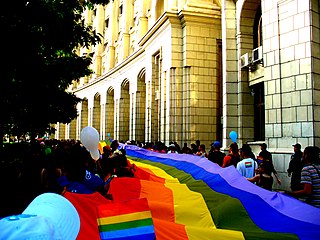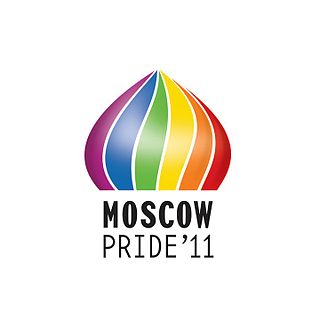Lesbian, gay, bisexual, transgender, queer, intersex, and asexual (LGBTQIA+) people frequently experience violence directed toward their sexuality, gender identity, or gender expression. This violence may be enacted by the state, as in laws prescribing punishment for homosexual acts, or by individuals. It may be psychological or physical and motivated by biphobia, gayphobia, homophobia, lesbophobia, and transphobia. Influencing factors may be cultural, religious, or political mores and biases.

A pride parade is an event celebrating lesbian, gay, bisexual, and transgender (LGBT) social and self-acceptance, achievements, legal rights, and pride. The events sometimes also serve as demonstrations for legal rights such as same-sex marriage. Most occur annually throughout the Western world, while some take place every June to commemorate the 1969 Stonewall riots in New York City, a pivotal moment in modern LGBT social movements. The parades seek to create community and honor the history of the movement. In 1970, pride and protest marches were held in Chicago, Los Angeles, New York City, and San Francisco around the first anniversary of Stonewall. The events became annual and grew internationally. In 2019, New York and the world celebrated the largest international Pride celebration in history: Stonewall 50 - WorldPride NYC 2019, produced by Heritage of Pride commemorating the 50th anniversary of the Stonewall Riots, with five million attending in Manhattan alone.

Lesbian, gay, bisexual, and transgender (LGBT) people in Serbia face legal challenges not experienced by non-LGBT residents. Both male and female same-sex sexual activity are legal in Serbia, and discrimination on the basis of sexual orientation is banned in areas such as employment, education, media, and the provision of goods and services, amongst others. Nevertheless, households headed by same-sex couples are not eligible for the same legal protections available to opposite-sex couples.

Lesbian, gay, bisexual, and transgender (LGBT) people in Ukraine face legal and social challenges not experienced by non-LGBT individuals; historically, the prevailing social and political attitudes have been intolerant of LGBT people, and strong evidence suggests this attitude remains in parts of the wider society. Since the fall of the Soviet Union and Ukraine's independence in 1991, the Ukrainian LGBT community has gradually become more visible and more organized politically, organizing several LGBT events in Kyiv, Odesa, Kharkiv, and Kryvyi Rih.

Lesbian, gay, bisexual, and transgender (LGBT) people in Bosnia and Herzegovina may face legal challenges not experienced by non-LGBT residents. Both male and female forms of same-sex sexual activity are legal in Bosnia and Herzegovina. However, households headed by same-sex couples are not eligible for the same legal protections available to opposite-sex couples.

Obraz is a far-right political organization in Serbia. The Constitutional Court of Serbia banned Obraz in 2012, although it shortly after re-registered under a similar name.

Lesbian, gay, bisexual, and transgender (LGBT) people in Turkey face legal challenges not experienced by non-LGBT residents, though the overall situation is considered to be less repressive when compared to most other Muslim-majority countries.

Bucharest Pride, known previously as GayFest, is the annual festival dedicated to LGBT rights in Romania, taking place in Bucharest for nearly a week. Current event organizer is Kyle David Kipp. It first took place in 2004 and now occurs in May–June of each year, culminating with the March of Diversity. It is organised by the non-profit organisation ACCEPT, the country's largest lesbian, gay, bisexual and transgender (LGBT) rights organisation. The festival also receives funding from the Romanian Ministry of Health and the National Council for Combating Discrimination, as well as a number of private organisations, such as the Open Society Institute and the British Council in Romania.

Lesbian, gay, bisexual and transgender (LGBT) people in Georgia face significant challenges not experienced by non-LGBT residents. Georgia is one of the few post-Soviet states that directly prohibits discrimination against all LGBT people in legislation, labor-related or otherwise. Since 2012, Georgian law has considered crimes committed on the grounds of one's sexual orientation or gender identity an aggravating factor in prosecution. The legislative ban on discrimination has been enacted as a part of the Government efforts to bring the country closer to the European Union and make the country's human rights record in line with the demands of Georgia's European and Euro-Atlantic integration.

Lesbian, gay, bisexual, and transgender (LGBT) people in Moldova face legal and social challenges and discrimination not experienced by non-LGBT residents. Households headed by same-sex couples are not eligible for the same rights and benefits as households headed by opposite-sex couples. Same-sex unions are not recognized in the country, so consequently same-sex couples have little to no legal protection. Nevertheless, Moldova bans discrimination based on sexual orientation in the workplace, and same-sex sexual activity has been legal since 1995.

Moscow Pride is a demonstration of lesbians, gays, bisexuals, and transgender persons (LGBT). It was intended to take place in May annually since 2006 in the Russian capital Moscow, but has been regularly banned by Moscow City Hall, headed by Mayor Yuri Luzhkov until 2010. The demonstrations in 2006, 2007, and 2008 were all accompanied by homophobic attacks, which was avoided in 2009 by moving the site of the demonstration at the last minute. The organizers of all of the demonstrations were Nikolai Alekseev and the Russian LGBT Human Rights Project Gayrussia.ru. In June 2012, Moscow courts enacted a hundred-year ban on gay pride parades. The European Court of Human Rights has repeatedly ruled that such bans violate freedom of assembly guaranteed by the European Convention of Human Rights.
This is a timeline of notable events in the history of the lesbian, gay, bisexual and transgender (LGBT) community in Canada. For a broad overview of LGBT history in Canada see LGBT history in Canada.

Widespread protests and riots in Serbia and North Kosovo followed the proclamation of independence by the Republic of Kosovo on February 17, 2008. Protests were also held by Serbs in Bosnia and Herzegovina and Montenegro.

Sofia Pride Parade is a peaceful march of LGBT people and their relatives and friends, which combines social and political protest with entertainment such as live concerts. It takes place every year in the month of June in Bulgaria's capital Sofia since 2008. The first Sofia Pride parade was held on June 28, 2008, on the same date as the Stonewall riots in New York City that occurred in 1969. Same-sex sexual activity became legal on May 1, 1968. Between 1968 and the collapse of communism in 1989, no publicly gay movements nor places of social gatherings existed. After democracy was reestablished in 1990, several gay bars and clubs opened doors in the capital of Sofia as well as in Varna and Plovdiv.

Lesbian, gay, bisexual, and transgender (LGBT) people in North Macedonia face discrimination and some legal and social challenges not experienced by non-LGBT residents. Both male and female same-sex sexual activity have been legal in North Macedonia since 1996, but same-sex couples and households headed by same-sex couples are not eligible for the same legal protections available to opposite-sex married couples.

The Serbian Movement Dveri, commonly just known as Dveri, is a nationalist and right-wing populist political party in Serbia. Its most recent president was Boško Obradović, who is one of the co-founders of the party.
Homosexuality in Serbia was first criminalised from 1860 through various regimes, until its first decriminalization in the Socialist Autonomous Province of Vojvodina in 1977. When Vojvodina was reintroduced fully into the Republic of Serbia legal system during the breakout of Yugoslavia, it was recriminalised again, until 1994, when it was decriminalised in the entire Serbia.

The first Bialystok equality march took place on 20 July 2019 in Białystok. Approximately a thousand pride marchers were opposed by thousands of members of far-right groups, ultra football fans, and others who violently attacked the marchers. Following the attack, solidarity events were held in Poland.

Belgrade Pride is an annual pride parade held in Belgrade, Serbia to celebrate the lesbian, gay, bisexual, and transgender (LGBT) people and their allies.

LGBT Pride Month, often shortened to Pride Month, is a month, typically June, dedicated to celebration and commemoration of lesbian, gay, bisexual, and transgender (LGBT) pride. Pride Month began after the Stonewall riots, a series of gay liberation protests in 1969.


















